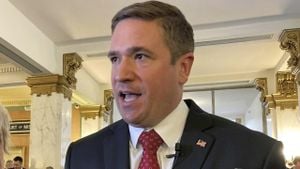On November 26, 2024, Russian authorities confirmed the capture of James Scott Rhys Anderson, a British national who was reportedly fighting alongside Ukrainian forces. Anderson, 22, is said to have previously served as a signalman in the British Army. His situation has raised alarm among family members and friends, especially as he now faces severe charges from the Russian government.
The Russian Investigative Committee has leveled accusations of terrorism and mercenarism against Anderson. This is part of Russia's continuous campaign against foreign volunteers fighting for Ukraine, often categorizing them as mercenaries to deny them protections under international law. Following his capture, Anderson appeared in a video on Telegram, visibly distressed, where he identified himself and acknowledged his military background.
Scott Anderson, James's father, shared his shock and fear upon hearing the news. After receiving the video from James's commander, he expressed his immediate concerns about his son's wellbeing and safety. "I could see straight away it was him. He looks frightened, scared, and worried," Scott Anderson told the Daily Mail, highlighting the anxiety surrounding the treatment of prisoners by Russian forces. His father had pleaded with James not to join the fight, emphasizing the dangers involved.
The situation is particularly troubling due to the historical precedents set during the conflict. For example, two other British fighters, Aiden Ashlin and Shaun Pinner, were captured last year and faced death sentences before being released during a prisoner exchange. The increasing number of captures of foreign volunteers hints at Russia's intensified crackdown aimed at dissuading foreign support for Ukraine.
Reports indicate Anderson's capture occurred amid heightened military operations within Russia’s Kursk region, where Ukraine has conducted aggressive counteroffensives since August. This area has gained strategic importance, as it has changed hands multiple times. According to Reuters, more than 40% of previously held territories have been lost by Ukraine, which has escalated the urgency for both sides.
Anderson's case is complicated by recent developments between the UK and Russia, particularly as Britain has lifted restrictions on providing Ukraine with longer-range Storm Shadow missiles. This decision has been met with fierce criticism and warnings from Russian authorities, who view it as justification for increased military responses. President Vladimir Putin has indicated there would be significant consequences for any country supplying arms to Ukraine, reiteratively underscoring Russia's commitment to countering perceived threats.
James's enrollment in Ukraine’s International Legion, established to recruit foreign volunteers to assist Ukrainian forces, is also part of this broader conflict. Such programs were initiated following Russia's invasion to bolster Ukraine's military capabilities with skilled personnel willing to fight for its sovereignty. Enlisted personnel can earn salaries varying significantly based on role, with some contracts offering upwards of $4,800 monthly.
This incident sheds light on the increasingly perilous situation for foreign nationals participating as combatants. Anderson's predicament raises important discussions about the status and rights of foreign fighters, highlighting considerable risks entailed with participating in foreign conflicts. The legal frameworks governing these kinds of involvements remain murky and complex, especially when the captured participants can be framed as mercenaries rather than legitimate combatants entitled to protection under the Geneva Conventions.
Foreign Secretary David Lammy stated the UK government would strive to support Anderson, though details of any diplomacy have been scant. The urgent call for action to protect Anderson and negotiate his release reflects concerns not only for his fate but also sets precedent for how similar cases might be dealt with moving forward.
Anderson's situation has served to galvanize discussions on the ramifications of individual involvement in conflicts outside one’s home country. Many are left wondering what the future holds for those who step onto battlefields filled with uncertainty, whether for political beliefs or personal convictions. Anderson's capture hits home some core issues relating to legality, morality, and the tangible costs of global military engagements.
The case serves as a potent reminder of the war's human aspect, prompting reflections on the responsibilities of those who opt to engage militarily across borders and the repercussions not just on themselves, but their families and home countries as well. How the UK responds to the charges against Anderson remains to be seen, but one thing is certain: the shadow of war looms large, casting uncertainty on the lives it touches.



